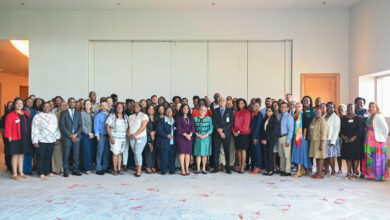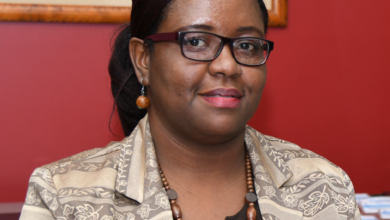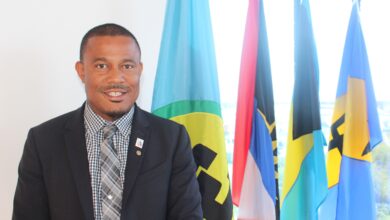“While I fully understand the political constraints faced by our Heads of Governments in the court of public opinion, as UN Secretary-General Special Envoy, I must continue to make the case that principles of human rights demand that the barriers to HIV related stigma and discrimination be removed. I urge Ministers of Government and other leaders to join as champions for changing attitudes and breaking down those barriers for social justice.
Failing which, it would be impossible for the Caribbean to end the AIDS epidemic in the foreseeable future. This would result in huge human, social and economic costs to our nations”
Edward Greene, statement to The Council for Human and Social Development (COHSOD)
September 27, 2014
1. Opening windows to advocacy
During 2014, the Caribbean Special Envoy has continued to advocate for the major priorities in the UN High Level Meeting 2011, in particular, “shared responsibility” and “every woman, every child”. He has been requested to take the lead role in advancing the human rights agenda in the Caribbean consistent with the recommendations of the Global Commission on HIV and Human Rights and in the in keeping with the Caribbean Justice for All (JFA) programme. Several missions have been undertaken in this regard leading to positive results.
The umbrella JFA programme is being coordinated by the Pan Caribbean Partnership Against HIV and AIDS (PANCAP) in collaboration with UNAIDS with the endorsement of the CARICOM Heads of Government. The current strategy involves inclusion of the UNAIDS 90-90-90 treatment goals as part the JFA roadmap in short-, medium- and long-term scenarios. This strategy originated as a recommendation from the 19th Special Session of the CARICOM Council for Human and Social Development (Ministers of Health), September 2014. It was further refined into actionable recommendations in subsequent meetings between the Special Envoy and parliamentarians in Jamaica, Haiti, Belize and Trinidad and Tobago. This strategic approach is an expedient response to the “push back” to JFA by a group of church leaders focusing on the narrower issues of punitive laws, rather than the broader principles of human rights and leaving no one behind. They have, however, more recently agreed to the formation of a regional caucus coordinated by the United Theological College of the West Indies (UTCWI) comprising young priests from across the Caribbean in a process leading to a regional consultation on the theme: “the contribution FBOs to ending the AIDS epidemic in the Caribbean.” This event is to coincide with World AIDS Day, 2015. The Caribbean Council of Churches and the World Council of Churches have agreed to collaborate with UTCWI in its organisation and implementation. The UN Special Envoy has remained continuously engaged with the faith leaders.
Several other positive results of the missions so far require follow up at the operational levels. First, there has been unanimous agreement among all stakeholders that foremost among those elements of the JFA roadmap to be achieved in the short run (2015-2016) is making the Caribbean the first region in the world to eliminate mother-to-child transmission. Seven countries should qualify for WHO certification by the end of 2015, and another four countries are in close range. Second, is the agreement from the National Family Planning Associations in Jamaica, Belize and Trinidad and Tobago in collaboration with UNFPA to promote the sexual and reproductive health agenda with special reference to eliminating violence against women and children. The First Lady of Belize has agreed to be the bridge between her counterparts across the Caribbean and Central America. Third, a possible model for other Caribbean countries is being actioned by the Cabinet representatives of Belize. This has been led by the Ministers of Foreign affairs and the Attorney General, Health and Education with the support of opposition parliamentarians, faith leaders and civil society to formulate a cabinet paper on the phased implementation of the JFA roadmap. Fourth, is promoting and sustaining a mechanism for government and opposition parties to collaborate in the AIDS response.
2. Addressing varying causes of vulnerability
The challenges that confront the Caribbean include mixed successes. They cut across demographic factors and vulnerable groups. While, for example, Haiti, rated by the World Bank among the world’s lowest-income countries, has shown significant improvements in reducing HIV prevalence and mortality rates in the 2014 UNAIDS Report, Trinidad and Tobago , a high-income country regressed with increased rates of HIV infections and related deaths. Haiti has also demonstrated reduction in mother-to-child transmissions and has introduced a novel community training programme for midwives in keeping with its cultural norms. While Trinidad and Tobago, ahead of the pack four years ago with one of the most modern health facilities in the region, has slipped. UNAIDS and other opinion surveys show that public attitudes support the retention of punitive laws in Jamaica, but less so in Trinidad and Tobago. Also, the uptake of the UNAIDS Investment strategy for HIV in most countries of the Caribbean, especially Jamaica, has been very positive. Following consultations with the Special Envoy and the UN Regional Coordinator and the UNAIDS Regional Support Team, Trinidad and Tobago has recently agreed to revamp its multisectoral coordinating mechanisms for HIV and AIDS.
3. Confronting the future through collective leadership and global solidarity
The major Caribbean political advocate for programmes to end the AIDS epidemic, Dr Denzel Douglas, has recently lost the General Elections in St Kitts and Nevis (16 February 2015). He will be replaced as Lead CARICOM Head of Government for Health and HIV. This means building new relationships, which will no doubt require the support of the UN System and in particular, UNAIDS. There is also a current trend for the Caribbean Countries to gravitate toward an integrated health approach, which includes HIV and AIDS as a cost effective way to deal with the growing co-morbidities of health and development. Under these circumstances, there is need for the Caribbean to promote collective leadership embracing a cross section of stakeholders. These should include the ambassadorial corps in the major capitals such as New York and Washington, D.C. in the United States; London, United Kingdom; and Ottawa, Canada. In this regard, theCARICOM-African Union initiative on shared responsibility, launched in Geneva by the UNAIDS Executive Director (May 2014) with Ministers of Health and other officials from both regions, is an illustration of global solidarity that the UN Secretary-General may wish to support. Notwithstanding all the above, the Special Envoy’s interactions over this past year, in particular, have led to the optimistic view that building on the current youth leadership and giving it greater prominence in the collective leadership of the Caribbean provide the best chance of ending the AIDS epidemic in the region.






